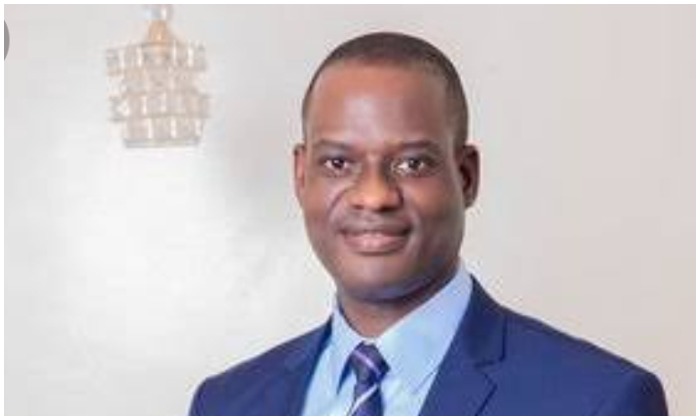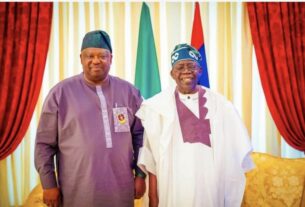Presidential Fiscal Policy and Tax Reforms Committee chairman, Mr Taiwo Oyedele. Credit: State House
Nigeria currently spends less than 50 per cent of its revenue on debt servicing.
This was disclosed by the Chairman of the Presidential Fiscal Policy and Tax Reforms Committee, Mr Taiwo Oyedele.
He spoke as the keynote speaker at PwC’s Executive Summit on Nigeria’s Tax Reform, with the theme “The New Tax Era: What Nigeria’s Tax Reform Means to Individuals and Businesses”, in Lagos on Monday,
According to him, the government was spending almost 97 per cent of its revenue on debt servicing before the economic reforms.
But he said, “We’ve cleared unmet forex futures that were more than $7bn. And we move from under $4 bn external reserve to over $20bn today. Budget deficit is declining, and we’re spending more on infrastructure.
“Tax to GDP ratio moved from under 10 per cent is now 13.5 per cent in two years. Instead of 97 per cent, service debt is now under 50 per cent in two years. We no longer print money to spend. Rather, we’ve paid down part of the ways and means that the previous administration printed”.
He said, “Nigeria today, without reforms, would have looked like that. Bigger deficits, more naira printed. We will have easily over $10bn unmet forwards. Tax to GDP ratio will be less than 10 per cent. We’ll be spending over 100 per cent of our revenue to service debts. You hold money; you will not find PMS to buy. There’ll be more poverty, and there will be more ways and means.
“I thought to bring the currency. I’ll show you. So, this currency, this banknote in my hand, is 100 trillion Zimbabwean dollars. I’m not 100 trillion one notes. This note, at the time I got it, was barely enough to buy a loaf of bread. I gave my friend, whom I got this from, $10 and he is still grateful till tomorrow. This is what would have happened to Nigeria. Nigeria was the road to Venezuela and Zimbabwe.”
Oyedele said the country could have reached a $1bn economy by now if the government had begun the ongoing economic reforms a decade ago.
“If some of these reforms that were done in the past two years had been done 10 years ago. I tell you authoritatively today, Nigeria will be a $1bn economy guaranteed. And the price of PMS will be under N300/litre because the exchange rate will be under N300 to the USD.
“We’ve done this analysis over the past 10 years. Comparable balance of payment between Nigeria, Kenya and South Africa. Yet naira has lost six and a half times more value than Kenya shillings and South African rand. If only we had maintained the same level of stability as those two other countries. Nigeria will be a $1tn economy. What that means is the size of the middle class will probably be 10 times what it is. Every single investor in the world will take a seriously enough”.
He argued that the government was wasting trillions of naira subsidising petrol, spending a large chunk of its revenue to service debt and was just printing naira at will.
“We committed them to subsidise PMS. It still wasn’t enough. NNPC took the taxes they were supposed to pay and they used that as well. It was not enough. They started taking the taxes of the other operators in the industry to also pay for the PMS. It still wasn’t enough. If we had continued till this day, the subsidy regime would have collapsed.
“Naturally, you would hold N100,000; you will not find a litre of PMS to buy. And I said that with all sense of responsibility. Responsibility because we’re running out of fiscal space to deal with the subsidy.
“Many people like you, including myself, knew there was a lot of corruption in it. That’s true. Could we have removed the corruption in the time frame? No. We had a huge budget deficit. We printed over N30tn to spend. We’re not building roads. It wasn’t that we’re building electricity. We were paying salaries,” he emphasised.
He disclosed that only three per cent of informal sector operators could pay taxes in Nigeria.
His words, “From our analysis, it is only the top three per cent of the informal sector that has the ability to pay. Therefore, in these reforms, we have legally exempted the bottom 97 per cent from paying taxes. Let them breathe. When they grow, they will have the capacity to pay. And many people would ask me, ‘Are you sure that all the companies in Nigeria will not become small?’.
“This will happen anywhere in the world if you create an exemption threshold. People want to force themselves to be under the threshold. Isn’t it because they don’t want to pay tax? It’s hard to pay tax anywhere in the world. Nigerians are not bad people. They’re not worse than people who live in other countries where things work. The difference is the system. So, the system we are building is that if you like to go and lie and say your business is small when it is not, we will find out, and there shall be consequences for those who underdeclare and engage in tax evasion.”
According to the FPTRC chair, the country’s tax is now progressive, and all the major taxes have become progressive.
Oyedele also disclosed that the gazette of the recently signed tax law was being printed in Lagos, and the final copy of the tax would be released to the public afterwards.
Recall that President Bola Tinubu signed four bills into law on June 26, but they would become effective on January 1, 2026.
Also, the Regional Senior Partner, PwC West Market Area, Sam Abu, noted that the reforms embarked on by the government were a good starting point for engaging in that conversation very robustly.
“Policy alone won’t deliver. Real change requires partnership and commitment. It required every single one of us here, the government, business leaders, and private sector individuals, to collaborate and work together to shape what will come up, to shape the kind of society and the kind of business community that we want to operate together, that we want to believe is okay. It requires us to engage with the spirit of these reforms, with sincerity, with integrity and with optimism,” he emphasised.
He said perspectives of stakeholders were critical in ensuring that those reforms take root and deliver on the outcomes that had been promised.
“Everybody has had a part to play in this regard. So, a PWC objective is clear. We want to remove complexity from tax. We want to help our clients anticipate risk and deliver solutions that are practical and tailored to their businesses, so that you, as business leaders, can focus on what you do best, which is making an impact on growing your businesses,” Abu added.
Major highlights of the new tax law are the exemption of employees who earn less than N800,000 annually from the personal income tax, the harmonisation of federal taxes and making the Federal Inland Revenue Service the sole collector of federal taxes.
Meanwhile, Partner and Tax and Regulatory Service Leader, Chijioke Uwaegbute, added that with the new tax law, by January 1, 2026, an entity that is resident abroad will be fully taxed in Nigeria if it is being controlled from the country.
“Control meaning where the board sits and things like that, or it is being effectively managed in Nigeria, being where the people who make the decisions sit. That is potentially a big one.
“Similarly, we have rules around indirect transfers as well. I have a situation where you dispose of or there’s a disposal of the shares of a foreign entity that owns a Nigerian company. And if that disposal means that there’s a change in the ownership of the Nigerian company, that disposal then is seen as a taxable event in Nigeria, not minding the fact that the shares that were disposed of are not of the Nigerian company.
“So all of these rules that we see here are really to reflect some of the advances we’ve seen in other countries, minimise opportunities for avoidance and ensure that Nigeria is able to tax its fair share of taxes,” he said while highlighting major changes in the new tax law.
The Punch





